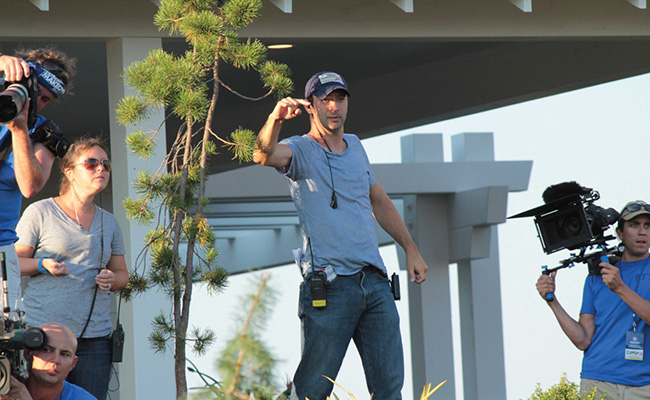At Ease, Soldier


Intense, engrossing, “Burning Blue” is a new film about a military investigation that turns up a possible “gay cell” on a Navy Aircraft carrier. Daniel (Trent Ford) and his best friend William (Morgan Spector) are best buddies. When Matthew (Rob Mayes) enters their unit, a love triangle tinged with jealousy develops.
Writer/director DMW Greer has crafted a poignant story about sexuality and the perceptions of masculinity within the culture of the military. He met with Out Front to discuss the movie.
Burning Blue began as a play. What prompted you to tell this story then and now as a film?
It was a need to exorcise very deep grief. It’s a personal story but it’s a work of fiction, one very much inspired by my real life. I was in the military. I had been in love with a guy for years who was killed flying. I lost a lot of friends in aircraft accidents, but when this guy was killed, his death was the epiphany. It was the seed that was planted for me to tell the story. But the catalyst was my closest friend’s response to my telling him I was in love with this other man. [He] shamed me. We were estranged from each other for almost a year.
Had you been involved with men before?
I had relationships with men prior to this, but not anything that was as deeply profound as this. It was a platonic relationship, but it was very special and intimate.
What can you say about the homoerotic tension in the film?
I think that human sexuality — and this is no great revelation from me — is a very, very complex and very nuanced, gray area. I think there is some element of sexual energy, sexual tension in almost every interaction, every relationship.
There is a very macho culture in the military. What can you say about this hyper-masculine culture?
I think it’s been spun in the media. In America, it’s the greatest exponent of that hyper-masculine imagery and storytelling, and I think it’s inaccurate. What I’ve seen in films, the portrayal of the military always seem a bit cartoonish and broad-stroked to me. Me, and all of my contemporaries in the Navy, are — again, clichéd terms here — very multi-dimensional guys, complex individuals that have different interests and are fallible.
Despite the sexual tension in the film, you are extremely discreet in filming the sex scenes. Can you explain why?
There is so much ambiguity in male sexuality and intimacy, and I think that is really heightened in the military setting. It was really deliberate. I didn’t want to make this about sex. What this was about was a really powerful, deep, deep love, which transcends sex. Certainly in any long-term relationship it does over time. Love trumps everything. Sex is a great galvanizer.
The guys dancing shirtless is possibly the film’s most erotic moment.
Imagination is a powerful thing. I think if each viewer can fill in the blanks visually and emotionally, it creates a more powerful experience.
Although Dan’s character is based on your experiences, there are differences. How would you have handled what Dan went through?
Probably not with nearly as much integrity and grace as Dan did. My niece was a helicopter pilot who left because of Don’t Ask, Don’t Tell. She ended up falling in love with her roommate.
Do you think the military is more likely to persecute queer members because of their sexuality?
Probably, yes. I think society and culture in general view it as a form of weakness. That is what we are striving to overcome.
Burning Blue is available on-demand and in select theaters June 6. For more information, visit ofcnow.co/blue
What's Your Reaction?
Gary M. Kramer is a contributing writer to various alternative queer news organizations across the country. He covers film for Out Front Colorado.










